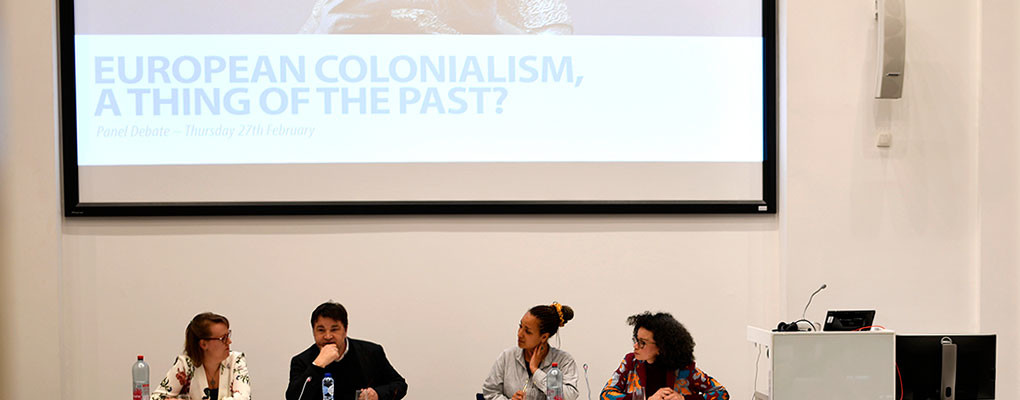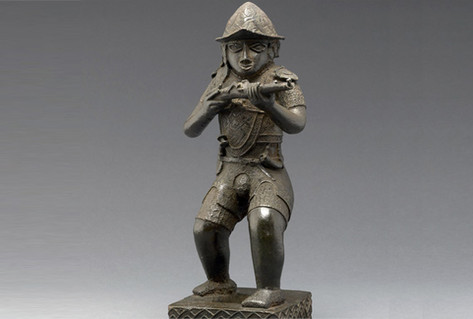
Written by Daphné Budasz
On 27 February 2020, the House of European History organised a panel debate with three historians specialised in the study of colonialism and its legacy: Amandine Lauro (FNRS/Université Libre de Bruxelles), Valika Smeulders (KITLV/Royal Netherlands Institute of Southeast Asian and Caribbean Studies & Rijkmuseum) and Jakob Vogel (Marc Bloch Centre & Sciences Po Paris). The debate was moderated by Daphné Budasz (European University Institute).
The history of European colonial past and the way it has been remembered or forgotten has become a highly topical issue in recent past years. The impact and consequences of European colonialism is increasingly debated in the public sphere and institutions are slowly starting to respond to this societal issue. The historians invited to this discussion agreed on the necessity to address this difficult past. They brought to light the many aspects of our contemporary societies that have been shaped by European colonialism.
A history still to uncover
The debate started by the claim that the colonial past should be understood as a shared history. Valika Smeulders explained that, in the Netherlands, the colonial heritage has been absent and denied. Yet, in the Dutch Caribbean, it cannot be ignored. “In the Caribbean, you don’t have the choice. It is a shared heritage. You can’t really escape it”, argued the historian. This is because colonial legacy is very much attached to the construction of a narrative in which today’s multi-ethnic society is rooted. Making this heritage visible in European countries like the Netherlands, however, requires a lot of work and this is why this debate is so polarised.
The lack of awareness regarding colonial legacy in Europe can partly be explained by the fact that for a long time, colonial history was primarily an economic and political history. By questioning, for instance, what percentage of a country’s GDP derived from its overseas territories, European historians kept focused on themselves. Yet, for twenty years, social and cultural aspects of colonial history started to attract more attention, which contributed to recovering the colonised people’s experience.
Furthermore, while the history of colonialism has also long been dominated by military conquests, and political and diplomatic questions, Amandine Lauro interestingly underlined that in these narratives the dominant players are always men. She mentioned the current existence of Belgian and French postcolonial activist movements led by women who are raising the issue of contemporary articulations of gender and race and how it can be traced to the colonial period. “It is clear that all these issues about gender and sexuality are still very present notably because of the way they have been used in the two main lines of argumentation and of justification of colonial projects, namely the definition of the so-called “civilising mission” and the definition of racial categories and hierarchies. All these issues were clearly used to assert the so-called ‘backwardness’ of indigenous people and they were also built as irremediable points of difference between us and them. They were a basis for exclusion.” Although the impact of colonialism on gender and sexuality is slowly entering the public sphere and the mainstream media, Lauro noted that it is rarely addressed at the institutional level.
The importance of colonial heritage in European culture
According to Smeulders, there are differences between museums in the way they are dealing with the integration of colonial legacy. Anthropological museums are embracing the matter “because they are museums that have always presented the narrative of the ‘Other’ … The modern art museums are also dealing with it rather fast because one can easily bring contemporary artists and give them the floor. You don’t need to change your own education and your own way of seeing it.” In the end, historical museums are the ones that are struggling the most with colonial heritage because “they are dealing with that fixed narrative which is really hard to bring change into.”
Guest speakers discussed how the House of European History deals with Europe colonialism. In the permanent exhibition, the visitors go through a gallery in which European industrial and technical advances in the nineteenth century are presented in parallel with the establishment of colonial rule in overseas territories, the exploitation of people and resources and the development of racial theories that gave credit to imperial ideology. For Lauro, it is significant that “the elements related to colonial history were not put in some corner but that they featured in a central place.” She referred more particularly to the showcase on European heritage where slavery and colonialism are present among 14 features spotlighted as core elements of European culture. Furthermore, Jakob Vogel noted that the House of European History adopts a limited definition of European imperialism. Since the museum narrative starts in the nineteenth century, it does not include early Spanish and Portuguese colonial ventures. He explained that it should be borne in mind that “in fact, a lot of stereotypes about the non-European “Other” were already shaped before the nineteenth century.”
The history of decolonisation is also essential to understand the persistence of colonial stereotypes. Indeed, as Vogel pointed out, the post-independence period saw the appearance of new discourses on colonialism in which the ancient tendency still prevailed. “Take for example the story of Babar. It is a wonderful book but also a colonial story depicting civilised elephants. We should keep in mind how persistent and important this heritage is in our culture.” Raising these challenges is crucial in the educational context and for school programmes. Although there is more and more research done on African history and colonialism, historians acknowledged a general reluctance to integrate this topic as part of the teaching of the history of Europe. Lauro argued that colonialism should be included in key historical episodes such as the two World Wars, the Enlightenment, the history of industrial revolution or the history of capitalism.
The role of diaspora
One other significant component of colonial heritage is the role it plays in the formation of diaspora identities. When Caribbean people arrived in the Netherlands, explained Smeulders, “they not only encountered the denial of their shared history but also the denial of their identity as being part of the Dutch kingdom.” Today, many local initiatives dealing with the recognition of colonial past in Europe are led by members of the diaspora. Such projects, which are widespread in the former colonies, generally take an interesting bottom-up approach. A good example is the “Rhodes Must Fall” movement in South Africa that was created by students fighting for the decolonisation of the education system.
Smeulders is currently working on a forthcoming exhibition on slavery and the Netherlands at the Rijksmuseum. She said that such projects are complicated to achieve because of the difficulty to find objects about the history of resistance and the abolition in the Caribbean. Unlike the UK and France, which have much larger collections that include art works depicting slavery, such representation did not exist in the Netherlands. As the result, the country still sees itself as a small, innocent and somehow tolerant nation. “It is harder to build an inclusive narrative when you have no object. It is hard to talk about something that people deny has ever existed.”
A topic that faces resistance
According to Lauro, Belgian relationship to its colonial past is paradoxical. On one hand, Belgium colonialism has been the most criticised because of the mass violence of the early colonial period under the Leopoldian regime, and of the crimes committed during the decolonisation process. On the other hand, Belgium is one of the least critical European countries when it comes to face colonial history. “It has often been said that in the 60s, 70s and 80s, Belgium experienced a colonial amnesia, but I think it is more a problem of not listening – and of silencing.”
The practice of ‘Black faces’ in Belgium folklore, that has recently attracted a lot of international attention, shows that “Belgium encounters a political problem that lied on the denial of racial discrimination and colonial violence” explained Lauro. Because Belgium colonial history is taught very little at school, people struggle to connect Black face practices with racial discrimination and the context of the colonial past.
In today’s Europe, there is a political necessity to address the violence of the colonial past and the social exploitation that was attached to colonial rule. According to Vogel, “One of the reasons why it is difficult to address these questions is because there is still a significant amount of colonial nostalgia. Think about the number of colonial towns that were made World Heritage Sites all over the world. In a strange manner, the local inhabitants somehow integrated this colonial past as part of their own identity. History if full of really complex issues.” He also mentioned that in Brexit Britain, the colonial nostalgia is very present within a certain elite. The idea that Europeans brought modernisation to the rest of the world continues to constitute a common understanding. These narratives that have been coined already in colonial time are difficult to erase.
This debate revealed why it is crucial for Europe to engage with this difficult past, and that we should challenge these narratives that keep romanticising colonialism and present it as something that was not so harmful and that included positive sides. Acknowledging the colonial legacy in our contemporary societies is an essential step in the long process of decolonising European minds.

